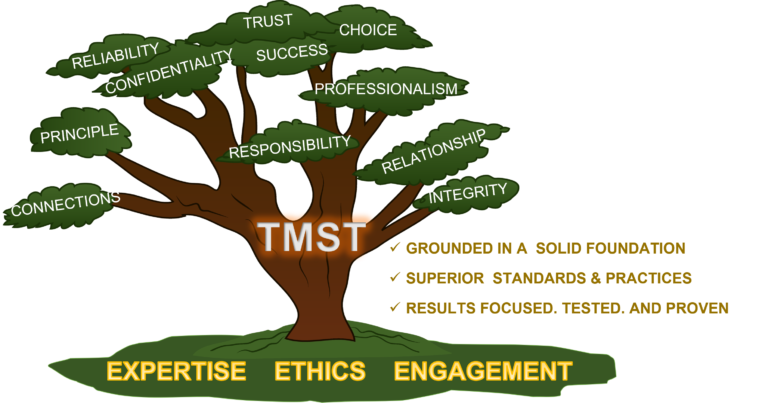Current technology has fostered a massive proliferation of data and the transmission of that data through innumerable communications paths. That proliferation, coupled with an often-transient workforce, creates a business environment unlike any previously seen in our country. The underlying issue is how companies avoid proprietary information available through multiple electronic mediums and simultaneously avoid proprietary knowledge that may be accessible to former employees in today’s business. At TMST Consultants, we treat ethical behavior as a core value, as the picture below illustrates. We value the expertise our consultants bring to the company, just as we value our ability to engage the critical personnel of importance to our clients. Those two capabilities would only be possible with a strong ethics program.

What and who determines proprietary information?
The National Institute of Standards and Technology (NIST) defines proprietary information as
“Material and information relating to or associated with a company's products, business, or activities, including but not limited to financial information; data or statements; trade secrets; product research and development; existing and future product designs and performance specifications; marketing plans or techniques; schematics; client lists; computer programs; processes; and know-how that has been clearly identified and properly marked by the company as proprietary information, trade secrets, or company confidential information. The information must have been developed by the company and not be available to the Government or to the public without restriction from another source.”
This exhaustive definition can be summarized by defining proprietary information is anything a company declares that isn’t openly shared with others. TMST has the legal and ethical responsibility to adhere to every client’s security requirements regarding proprietary information. Ethically this is true with or without an NDA. Failure to protect proprietary client information presents potential legal issues and can result in disqualification from contract bids and vocation of contract wins. TMST involvement would gravely impact our ability to keep current clients and attract new ones.
TMST’s written policies and practices, and the imperative professional conduct of all consultants.
Ethics is not just a sometimes thing. It is at the very core of our corporate culture and is comprised of two dimensions. There is a top-down training, education, and practice dimension focused on how we conduct our day-to-day business. There is a bottom’s up dimension that places responsibility on each consultant to conduct all their business activities in a manner that epitomizes ethical conduct. Client privacy and the protection of proprietary information are embedded in our DNA and a true strength of the company.
Corporate Responsibility.
TMST leadership sets and maintains the standards of ethical conduct. Corporate leadership is always available to discuss ethical conflicts both potential and real. Work activities are periodically monitored ensuring security and other requirements are adequately addressed. TMST strives to identify and resolve potential issues before they become challenges. We maintain a transparent work environment internally and externally with all clients. TMST fosters clear communication and strives to identify and discuss all issues both good and bad without fear of reprisal or adverse action.
Individual responsibility.
All consultants must adhere to ethical behavior by signing the TMST Code of Conduct during their onboarding and reconfirming on an annual basis. All TMST consultants are directed to report potential and actual issues immediately. This includes the accidental discovery of information that conflicts with ethical or proprietary guidelines. Additionally, while supporting clients, all consultants are responsible for reading, understanding, and adhering to the client’s ethical policies and procedures. Consultants are mandated to understand the client’s proprietary information and security safeguards.
What if a breach of Proprietary Information occurs?
Any knowledge of negative ethical issues, a breach of proprietary information, or a violation of security protocols, whether intentional or unintentional, must be reported immediately to the TMST Chain of Command. Upon guidance, additional disclosures (client) will be prompted. TMST will conduct an internal investigation to determine the extent and impact of all incidents. The appropriate consultant(s) will support client investigations and inform the TMST Chain of Command. As proper, TMST will develop a remedial action plan internally or in concert with a client. Regular updates on the remedial plan progress are required. All consultants must keep the company informed on any issues affecting TMST operations or business.
Conclusion.
TMST strives to attain the highest ethical business standards in the industry. Our clientele demands the utmost trust and reliability and has grown accustomed to depending on us for absolute professional discretion, data security, and accountability. We are proud to put ethics above all else, which is supported by the growth our company has experienced through word of mouth and reputation.
